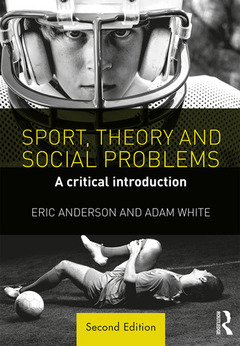Description
Sport, Theory and Social Problems (2nd Ed.)
A Critical Introduction
Language: English
Keywords
Young Men; Eric Anderson; Inclusive Masculinity Theory; sport and gender; Male Team Sport Athletes; sport and sexuality; American Football; sport and violence; Chronic Traumatic Encephalopathy; sport and social class; National Youth Council; sport and race; Concussion Report; sport and sexism; Hegemonic Masculinity Theory; sport and homophobia; Team Sport Athletes; sport and bullying; Decreasing Opportunity Structure; sport and racism; Jeff’s Story; sport and social theory; Competitive Team Sport; Adam White; TBIs; Men’s Team Sport; Vice Versa; Basketball Team; Rugby Team; School Physical Education Curriculum; Navajo Nation; Lesbian Athletes; Hazing Initiations; Inter-group Contact; Benjamin’s Death; Minority Stress Theory; Masculine Capital
Publication date: 07-2017
· 17.4x24.6 cm · Paperback
Publication date: 07-2017
· 17.4x24.6 cm · Hardback
Description
/li>Contents
/li>Readership
/li>Biography
/li>
In a revised, updated, and considerably expanded new edition of Sport, Theory and Social Problems, authors Eric Anderson and Adam White examine how the structure and culture of sport promotes inequality, injury, and complicity to authority at the non-elite levels of play in Anglo-American countries. By introducing students to a research-led perspective on sport, it highlights the operation of power, patriarchy, and pain that a hyper-competitive sporting culture promotes.
Each chapter includes at least one key social theory, which is made accessible and pragmatic. The theory is then infused throughout the chapter to help the student engage with a deeper understanding of sport. In addition to examining how sport generates otherness, distracts children from education, and teaches the acceptance of emotional and physical violence, this new edition also examines how organized, competitive sport divides us by race, denies children the right to their own governance, and promotes brain trauma and chronic traumatic encephalopathy in those who are too young to consent to play contact sports.
Sport, Theory and Social Problems: A Critical Introduction is an essential textbook for any sport studies degree with a focus on the sociology of sport, sport and social theory, children?s health and wellbeing, or sport and gender studies.
Introduction 1. Why We Value Organized, Competitive Sport 2. Sport’s Use in Teaching Obedience to Authority and Complicity to Abuse 3. Learning to Accept, Inflict, and Enjoy Violence and Injury 4. Head Games: Brain Injuries and Youth Sport 5. The Governance of Youth Sport: Rights, Representation and Consent 6. Sport’s Use in the Maintenance of Class 7. Sport’s Use in Stratifying Men 8. Sport’s Use in Marginalizing Women 9. Sport’s Use in Subordinating Racial Minorities 10. Sport’s Use in Excluding, Reproducing Stereotypes, and Othering 11. Changing Sport
Eric Anderson is Professor of Sport, Masculinities and Sexualities at the University of Winchester, UK. He holds four degrees, has published 17 books, over 60 peer-reviewed articles, and is regularly featured in international television, print, and digital media. Professor Anderson is recognized for research excellence by the British Academy of Social Sciences and is a fellow of the International Academy of Sex Research. His work shows a decline in cultural homohysteria and promotes inclusive attitudes toward openly gay, lesbian and bisexual athletes as well as a softening of heterosexual masculinities.
Adam White is a Lecturer at the University of Winchester, UK. In addition to publishing on the social inclusion of sexual minorities in sport, his doctoral research examines the structural and cultural matrix that promotes head trauma. He runs the Sport Collision Injury Collective and is a public-activist for protecting children from sport-induced brain damage.




